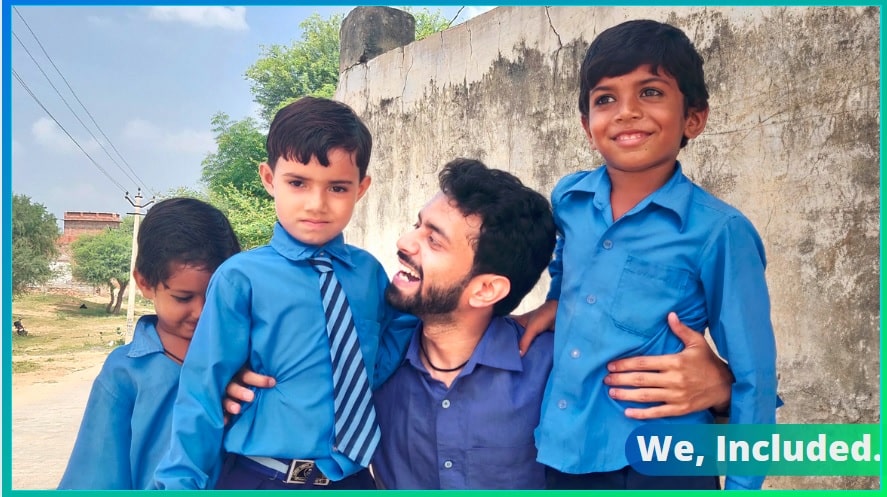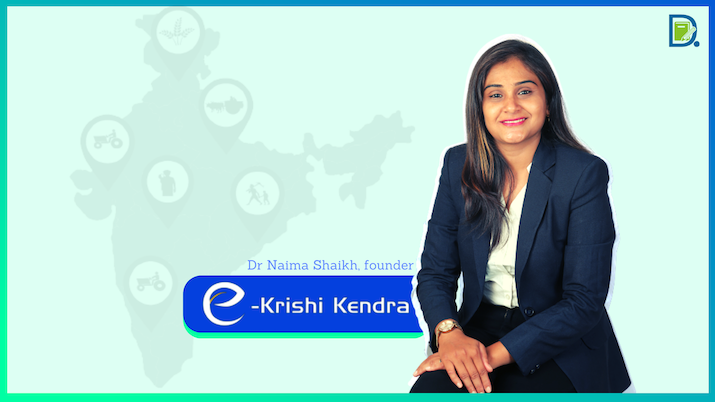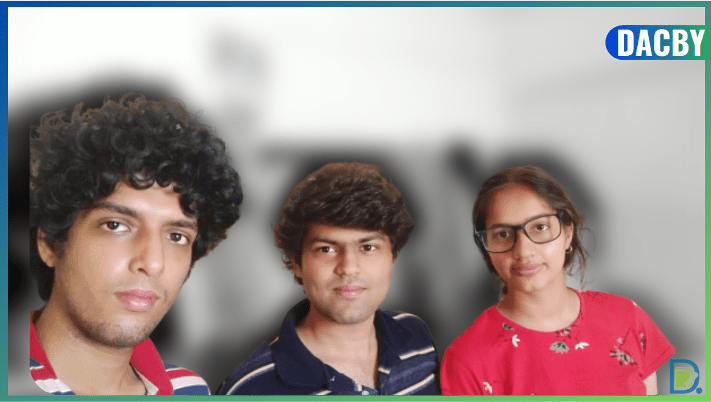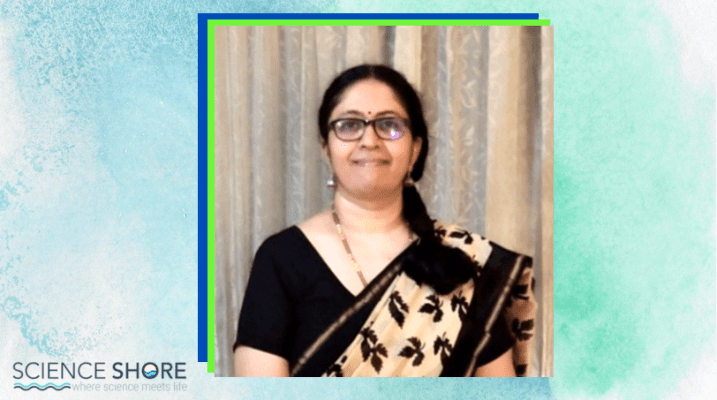We Included | Ankit Pandey Interview
Meet Ankit Pandey Founder of ‘We Included’
I am Ankit Pandey, Founder of We, included. and a Gandhi Fellow at the Piramal School of Leadership in Piramal Foundation.
I graduated from the School of Ecology and Environment Studies from Nalanda University and did Materials Science and Engineering from the National Institute of Technology, and in my previous roles with leading Council of Scientific & Industrial Research Laboratory and JSW Steel Ltd. firms in India.
I have worked extensively on energy projects and public-private partnerships (PPPs) in the infrastructure and Research and Development (R&D) space.
What is We, included all about?
The We, included. is all about re-imagining leadership, together! Under this initiative we have a vision to build the world’s leading lab and platform for innovative, implementable and scale-able solutions to the Sustainable Development Goals (SDGs).
By using the innovative mindset of young people and partner talents with leading companies, research institutions, foundations, non-profits, and investors, we aspire to provide next generation solutions for the SDGs.
Our mission is to accelerate disruptive ideas by engaging top talents in problem-solving and co-creation activities and by providing the support needed to bring the best ideas to life.
Now, currently working as a Gandhi Fellow at Piramal School of Leadership in Piramal Foundation, I have been engaging with more than 500 students in remote villages of Jhunjhunu district in Rajasthan, all of which are from a highly vulnerable socio-economical rural background in enhancing their life and entrepreneurship skills.
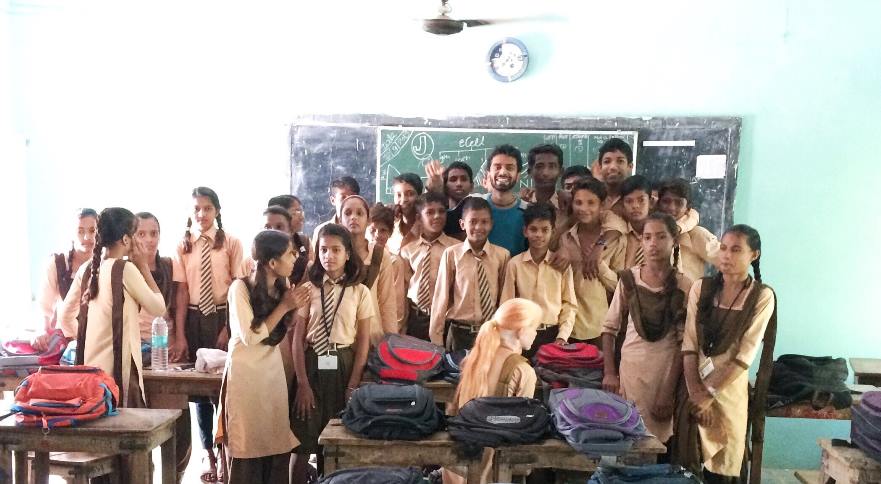
With my We, included. initiative, I aims to create opportunities for students to re-imagine their future through a structured Competency-Based Life Skills and Entrepreneurship Curriculum, with a focus on real problem solving, counselling for students and industry partnerships.
We included. aspires to implement a model where students in government schools start thinking big and do not restrict their future prospects to low paying jobs in the channelize sector. Through a rigorous and challenging life skill and entrepreneurship curriculum, We, included. aims to improve the life chances of secondary school students by opening them up to the world of innovation, collaboration and leadership, so that they can channelize their potential in multiple directions.
According to me, the ideal state will be once the challenges are achieved and are solved, it would result in the integration of life skills and entrepreneurial skills into the existing syllabus ensuring students become job-ready.
Focus on student-led ventures building confidence in students, developing entrepreneurial skills and motivating them to start their own ventures in various domains of national significance such as education, health, women and tribal empowerment, waste management etc.
Q. When and how did you think about “We included.”?
The Beginning
Encounters with the people whose stories were of the millions living in India – lead to the start of We, included. platform. An initiative that got seeded by me when I was doing his MS at the Nalanda University.
I believe that in the current world, the problems are not domain-specific, rather they are very much interconnected and complexly interwoven, and we need to look at these issues holistically.
With an objective to address the harsh realities of the unserved and under-served populations, We, included. has till now collaborated with more than 15 national and international organization including Harvard Research, The Queens Child Project, Calvary Indian Fellowship; and City & Climate Action, etc.
We, included. works on research findings, data analysis, case studies and mobilizing stakeholders and communities to develop the right leadership both at centralized and decentralized levels to have the higher penetration of the impacts at the grassroots.
The Operations of Think-and-Action Tank: We, included.
Before coming to Nalanda, I was in Kashmir for four years from where I also did my Engineering from NIT Srinagar; I experienced what I had only heard through news media and people who had never visited Kashmir themselves ever.
I experienced that the place called the heaven on Earth was struggling for the least – peace!
Then came Bihar, where I spent two years. One of the most fertile lands in India which not only had the potential for enormous agricultural and economic growth but has also given great leaders and bureaucrats to the country – remains one of the least developed states of India and is always addressed as the BIMARU state.
It was here that I realized that the crucial problems behind the stories that I encountered was because of the lack of effective and impact leadership in India.

Under my We, included. initiative I started researching with Prof. Sarnam Singh from Nalanda University who held the position of Group Director, Earth Resources and System Studies Group at IIRS, ISRO and has worked in the organisation for more than 28 years.
One of the reasons they both found out for Bihar being the under-developed state in the country was Electricity – the Energy Poverty!
My research which involved a comprehensive 350 household survey across the Nalanda district proved that decentralized solar rooftop PV systems could revolutionize the way we use, perceive and understand electricity.
That – it not only has the potential of mitigating the impacts of climate change by cutting down the GHGs emissions but can also help reduce the energy and economic disparity among the rural population by providing reliable and affordable energy accessibility.
I believe that with the coupling of right policies and leadership, it will create the ability to generate power, to share power, to sell power, all coming from their generating asset sitting on their property.
If it does happen, then we get to a point where every home has their independent supply of energy, that will give us the democracy of energy where everyone will have that choice, and everybody knows when they want to switch it on or off; whether they wish to access or store it.
That freedom getting back into the hands of the consumer would be the most exciting thing.

It was because of the We, included. work that I was selected as a Smart-City Fellow by the Government of Madhya Pradesh.
Here I worked with Mr. Rajat Srivastava, Economic and Policy Advisor, Ministry of Skill Development and Entrepreneurship, GoI alongside two IAS Officers, Smt. Chhavi Bhardwaj, District Collector and Shri. Chandramauli Shukla, Commissioner, Municipal Corporation of Jabalpur and Executive Director, Smart City Jabalpur on India’s first-of-its-kind Municipal Solid Waste to Energy (MSWtE) treatment plant and an award-winning project, the Jabalpur MSW (JMPL) to the critically important wetlands.
We, included. findings suggested the harvesting of macrophytes – water hyacinth and other nuisance vegetation present in the lake, causing eutrophication, must be removed manually or mechanically which in-turn could be used as the raw materials for the MSWtE treatment plants.
Q. From whom you got your inspiration to start “We included.” and who is your mentor?
We, included. is inspired and a product of stories of people with whom I interacted through my personal and professional journey. I call them The Stories, of Hope! Few of them are shared below:
The Stories, of Hope!
2017: Rumana, 18, who finished her Intermediate boards in Srinagar, Kashmir always wishes for peace and justice in her valley which she thinks has faded away because of the frequent unrest in Kashmir.
This according to her has not only derailed the economy of state but has also infected the education, poverty, violence and corruption.
2018: Manish Kumar, 32, a farmer based in Pipra, Bihar, belongs to a family that has been farming for at least 40 years now.
Pipra, where the majority of the households are still not on the map of grid electrification, about 1.5 years ago, Manish and his community members received decentralized solar PV panels from some Public-Private-Partner entity. But now these panels lay under the sun unused and decaying. (Video Link)
2019: Rajendra, 27, a Municipal cleaner, works at Sangram Sagar, Jabalpur, Madhya Pradesh. He says that once famous for its lakes, in the city Jabalpur this lake including others like Hanuman Taal and Supa Lake have been shrinking at an abnormally high rate.
Reasons he says are often due to their eutrophic conversion and containing more harmful algal blooms than other types of lakes.
Activities such as septic system failure or farming have led to an increase in the green colour of lakes through nutrient inputs which act as a fertilizer for algae.
2020: Nazmi, 14, a student of class 9th of the Government Secondary School in a rural remote village Bhimsar of Jhunjhunu district in Rajasthan.
Her father is a mason, and her family come from a deplorable socio-economic condition. Despite being the topper of her batch, she doesn’t know much different career options, she has no dreams and has accepted her fate that she will be married as soon as she finishes her school.
We, included. has its Centre for Social Innovation and Entrepreneurship incubated at the Piramal School of Leadership, an institution under Piramal Foundation in Bagar, Rajasthan.
Q. Explain more about “We included.” What makes it special?
We, included. works on the followings
- Source Talents: Working with trusted partners around the globe to source and select top talents with big ideas and a desire to create change.
- Explore the SDGs: Using the host country’s traditions and ways of living ignites new discussions and unlocks new perspectives on the SDGs.
- Select Ideas: Developing and selecting the top ideas via facilitated business model innovation, co-creation and collaboration among SDG Talents, with input from experts.
- Provide Support: The best solutions receive support for implementation by connecting the SDG Talents to capital, corporate partners, technology, and local networks.
- Develop Community: Through regional events, sharing platform, and alumni network a broader community of global talent is developed.
There are many talent and leadership organisations all over the world. What makes We, included. unique, is that we are creating a global lab and platform fully dedicated to the new SDGs, where talents can add value directly and access a unique ecosystem of corporations, think-tanks, foundations, non-profits, angel investors, etc.
The Sustainable Development Goals (SDGs) were agreed upon in 2015 by all UN member states and consist of 17 goals and 169 targets for the world to become a better place by 2030.
| |Read Also: Sona Founder of ‘Mapple Dreams – Express Entry to PR’ Shares Her Story |
Q. What challenges did you face while setting up “We Included.”? How did you overcome?
The very basis on which the We, included. is formed – the multi and inter disciplinary nature of current world’s problem solving was the main challenging task to structure and giving it a shape.
The first challenge was to give my startup a framework under which its different initiatives could be sub-grouped.
Secondly, the major daunting task was to identifying, reaching out, networking and work in close collaboration of several international and national organisations, institutions and think-tanks of which few names were already shared above in my story.
Third and the most important challenge (which still is being work upon) is to how to bring in the scale in the work we do. In the country where everything is in millions and billions, working in small portions won’t bring the change we dream of. For this we need to scale up enormously. This would again need the support, both funding and leveraging wise to create the large and significant impact.
Last but not the least, the challenge was of marketing and branding for which We, included. has been reaching out to the media houses, online communities and inspiring sites like that of Viral Indian Diaries.
Since my startup itself is in nascent stage and we all are currently going through a global crisis, it has been really encouraging to have been able to collaborate and share our work and stories via platforms like VID.
Q. What’s the current path, We included.’s funding status and what are the future plans?
Currently We, included. is self-funded but is supported by different national and international organisations from like The Global Academy-UK and Kaivalya Education Foundation, etc.
The Bright Future
“Everyone around me is talking about ideas…ideas that are to bring a large-scale social impact. If society was a person, I wonder how he/she could have handled such pressure from so many dimensions.
It seems like organizations have made it an agenda to churn out social entrepreneurs. Nothing bad about it…Nothing bad about it.
At the same time, I have to admit that I am bored of this madness to come up with large scale solutions. Every solution in this world would come from a project proposal.
The only way one can change the world is through an intervention model that is low on cost and high on impact. Some messiah had said this once.
Since then, everyone is game to change the world. All who wish to change the world have to understand metrics, per unit cost of the intervention, and impress a donor with unbreakable confidence.
There will be a model for the children of the nation. There will be a model for the farmers of the nation. There will be a model for the suppressed women of the nation.
A model for everyone who has to be changed…and we will have a beautiful world. A world of donors, change makers and beneficiaries. The review meetings will capture exaggerated sentences on social change.
And I know We included. will help develop research findings, mobilizing stakeholders and communities and Evidence-Based Policy Making (EBPM) which in-turn will help develop qualities like values of empathy, compassion and hope to deliver that and will help each of us to develop the right leadership making everyone a social change maker and a better leader.” Says Ankit signing off.
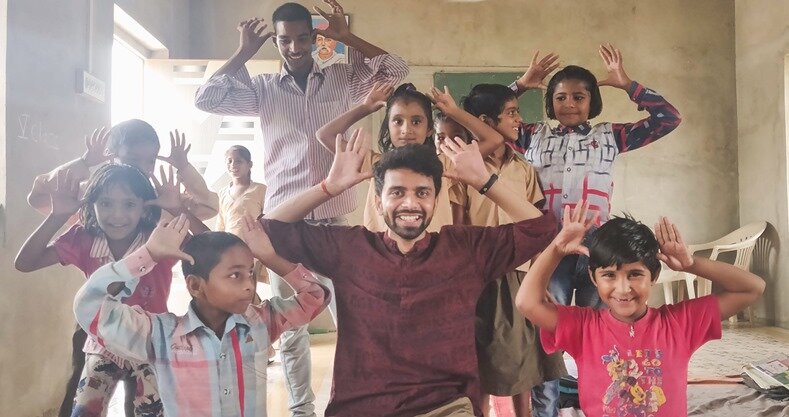
Follow We Included on Instagram | Facebook
The Viral Indian Diary is definitely a great platform for researchers, entrepreneurs and youth to engage, share, collaborate and impact human lives at large.
VID acts as source of inspiration, knowledge and community learning where people are given a chance to do something better for others, for the their community and make earth a better place, together.

